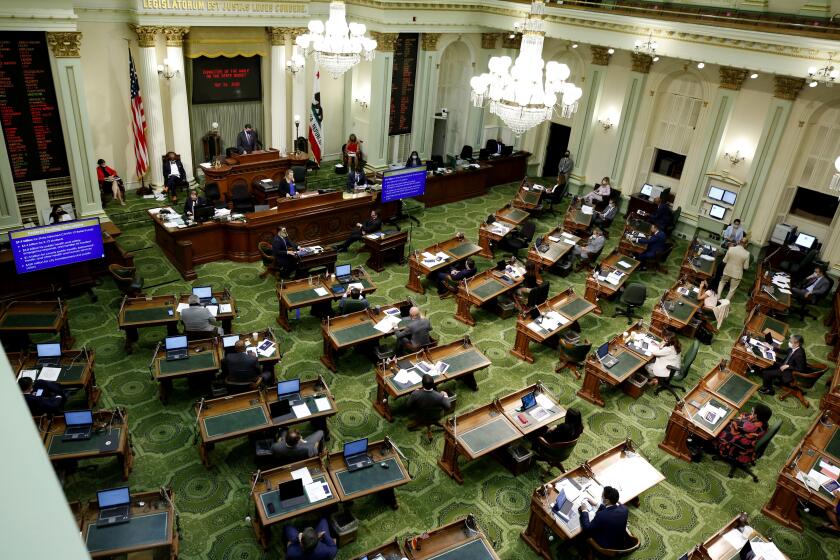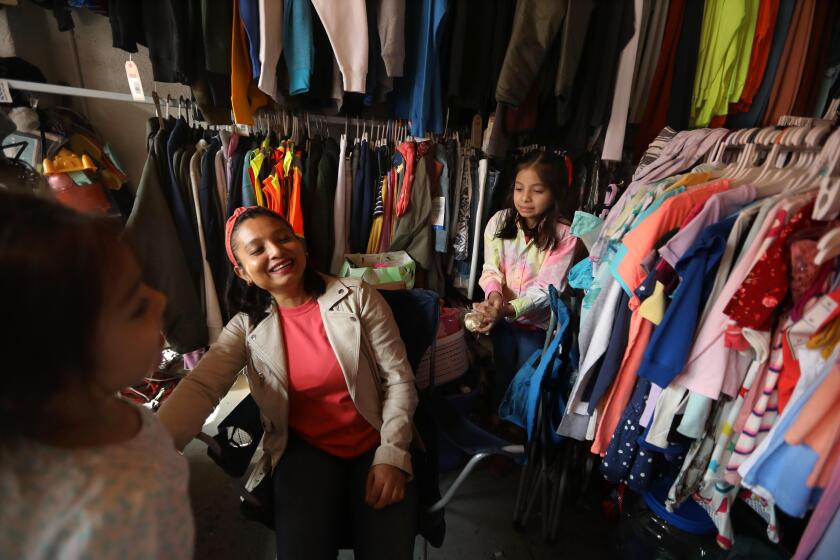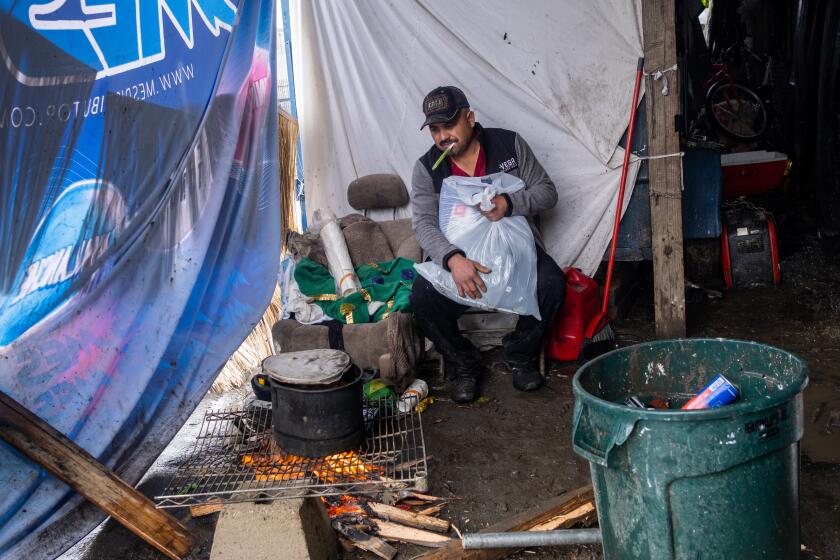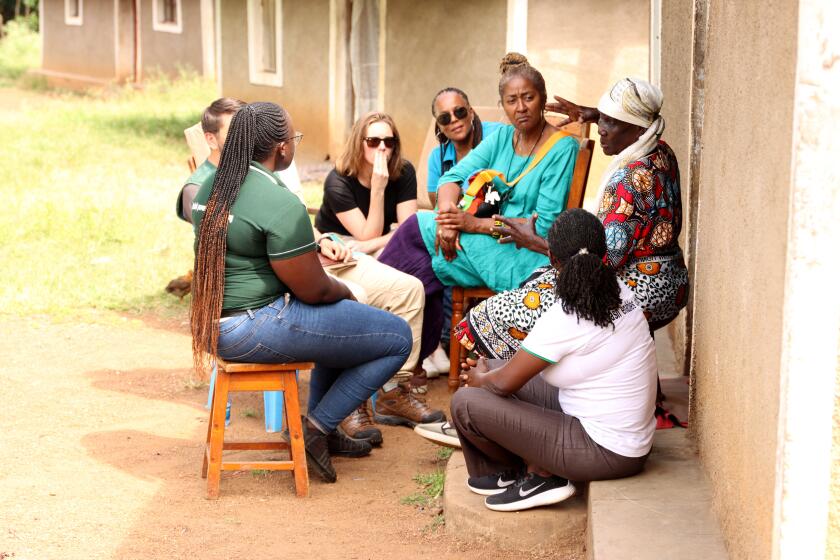This L.A. County city is the latest to offer unconditional cash. It aims to provide relief to families
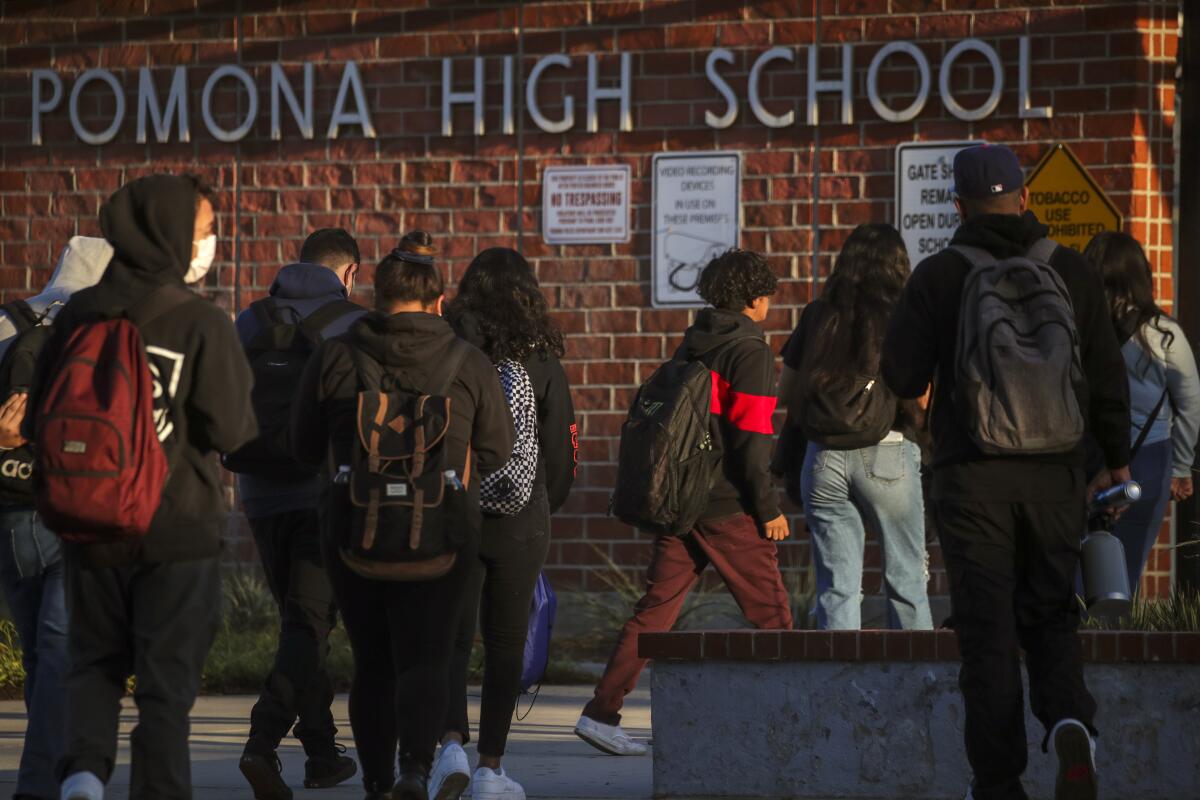
- Share via
The city of Pomona is the latest California locality to offer unconditional cash to some residents in hopes of providing much-needed budgetary breathing room to residents still recovering financially from the COVID-19 pandemic.
The Pomona Household Universal Grants Pilot Program, or Pomona HUG, will provide 250 people with $500 each month for 18 months. The money comes with no strings attached, and is intended to support families with young children in the eastern Los Angeles County city who are struggling to afford rent, child care and other expenses.
In Pomona, home to about 146,000 people, roughly three-quarters of residents are Latino and about 12% live below the poverty line.
“We’re hoping that it will provide some immediate relief to those families that are still behind on their rent,” said Beverly Johnson, the city’s acting neighborhood services director. “While this $500 is meant to relieve them of some of their stressors, it can also be used in whatever area they need, so there’s no restrictions in terms of what they can use the funding for.”
The California Legislature, by unanimous votes, has approved the nation’s first state-funded guaranteed income program.
More than 200 guaranteed-income experiments have popped up nationwide over the last four years in response to the pandemic, as well as racial injustice and widening economic inequality.
Proponents tout unconditional cash as a way to provide greater stability to vulnerable community members. They say the programs can change narratives around poverty by entrusting people to make decisions about their own finances.
Critics of a related proposal — universal basic income, which would provide a cash benefit to all Americans — question the political feasibility of grants that aren’t tied to work requirements, and whether the funding would come at the expense of existing health and food programs.
Southern California has emerged as a leader in the movement. One of the largest experiments in the country, the city of L.A.’s Basic Income Guaranteed: Los Angeles Economic Assistance Pilot, or BIG:LEAP, disbursed $1,000 a month for one year to 3,200 residents who were pregnant or had at least one child, lived at or below the poverty level and experienced hardship related to COVID-19.
In 2022, 3,200 people received monthly payments through the city of Los Angeles’ basic income program. Here is what’s happened a year after the program ended.
L.A. County’s guaranteed income program, BREATHE, is one of the nation’s longest-running projects, with 1,000 residents in low-income or working-class neighborhoods who were negatively affected by the pandemic receiving $1,000 monthly payments for three years.
Southern California is also home to more targeted efforts. There are guaranteed-income programs prioritizing former foster youths and pregnant people, funded by the state, as well as one for unhoused people in L.A.
These programs have the potential to address immediate economic hardship, reduce economic inequality and improve health outcomes as well as overall well-being, said Judith Perrigo, an assistant professor at the UCLA Luskin School of Public Affairs Social Welfare Department. The experiments are also rigorously studied, with researchers aiming to provide scientific evidence to policymakers considering incorporating direct cash payments into social safety net programs.
“As researchers, we’re curious to understand who does this work best for,” said Perrigo, who is studying the L.A. County and Pomona programs. “The truth is, as researchers, we don’t know that answer yet, but we’re all very interested and very curious to learn that.”
A monthly payment of $750 to $1,000 would allow thousands of the city’s homeless people to find informal housing, according to a policy brief by four L.A. academics.
Researchers are also trying to determine the most effective amount of cash, and how long it should be provided, said Sean Kline, a former director of the Stanford Basic Income Lab who is now a global advisor to the behavioral science organization ideas42.
As part of the Pomona project, which is funded through the federal American Rescue Plan, researchers will compare the experiences of the group that receives the unconditional cash with those of 350 additional people who get $20 stipends for 18 months. They are also interested in observing participants in their homes, to see how parents and guardians engage with young children, and intend to conduct interviews and surveys.
The goal, Perrigo of UCLA said, is to learn more about how extra cash — or the lack of it — affects the financial security and well-being of families with children under age 4, as well as food security, parenting and early childhood development.
“We know that the brain is developing rapidly in those first few years,” she said. “So just to think about the opportunities that every kid could have at that age — the investments that they can have, the time that they can have from their parents, because their parents have the opportunity to spend more time with them — it’s tremendous.”
Los Angeles County Supervisor Holly Mitchell and Assemblymember Matt Haney of San Francisco visited Kenya to study basic income. They came away with ideas for California.
Kline called the Pomona pilot a “bold move” that could provide more proof — for policymakers and the public — about the effectiveness of unconditional cash.
“It’s really going to take further work to challenge the harmful, often racialized and gendered stories America holds about poverty,” he said. “The more pilots there are, the more I think that story reshapes, to engender a more trusting, sort of accepting notion that families know best when it comes to figuring out how to survive and thrive.”
To be eligible for Pomona HUG, participants must at the time of application be a resident of the city, 18 or older, pregnant or the parent or legal guardian of a child under 4 years old and consent to participate in the UCLA research study. They must meet a lower-income threshold or have experienced unemployment or increased housing or food insecurity due to the COVID-19 pandemic.
Applications for the pilot program are open through July 8 and participants will be chosen by random lottery. First payments are expected to be disbursed via a reloadable debit card by Aug. 26.
This article is part of The Times’ equity reporting initiative, funded by the James Irvine Foundation, exploring the challenges facing low-income workers and the efforts being made to address California’s economic divide.
More to Read
Sign up for Essential California
The most important California stories and recommendations in your inbox every morning.
You may occasionally receive promotional content from the Los Angeles Times.
